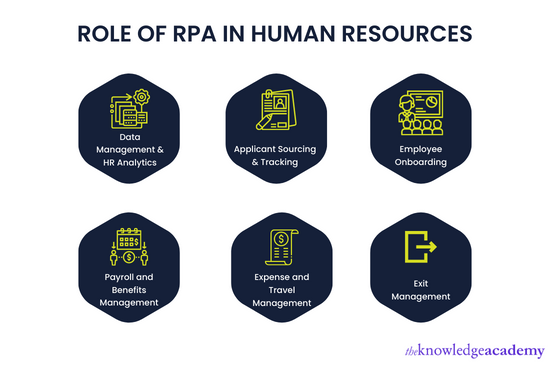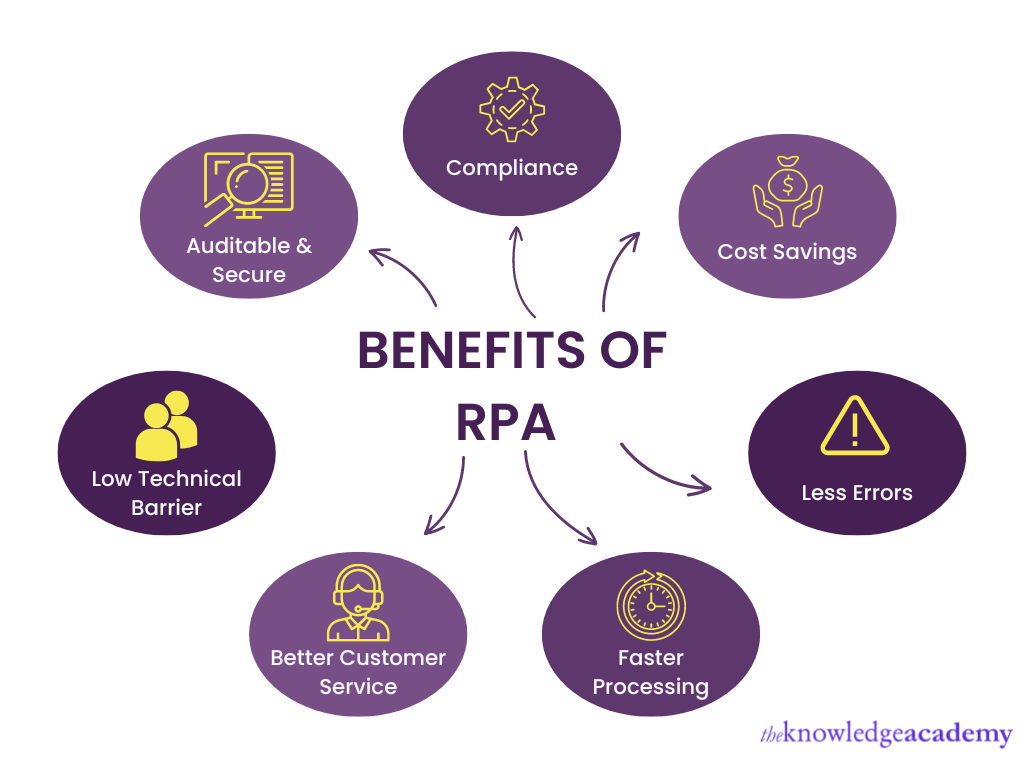We may not have the course you’re looking for. If you enquire or give us a call on +44 1344 203 999 and speak to our training experts, we may still be able to help with your training requirements.
Training Outcomes Within Your Budget!
We ensure quality, budget-alignment, and timely delivery by our expert instructors.

Adopting the right technology for your business is extremely important in a technology-reliant world. When it comes to cost-effective and easily implementable technology, Robotic Process Automation (RPA) is the way to go. The numerous Applications of RPA have collectively contributed to the growth of various industries.
According to the Deloitte Global RPA Survey, 78% of companies using RPA plan to invest more over the next three years. More and more industries are slowly opening up to the use of RPA. Check out the useful and real-time applications of RPA, including its benefits and use cases. Read more to learn further!
Table of Contents
1) What is RPA used for?
2) Top five Applications and Use Cases of RPA
a) Healthcare
b) Banking
c) Customer Service
d) Human Resources
e) Finance
3) RPA: Benefits
4) Conclusion
What is RPA used for?
Applications of RPA are seen in many multinational companies today. By doing so, business processes are streamlined and completed at a faster rate. RPA can automate all redundant tasks to increase employee productivity and company work efficiency, and RPA is generally used to perform multiple tasks. Applications of RPA across organisations have helped quicken the pace of tasks like data migration, quality assurance checks, and more.
Top five Applications and Use Cases of RPA
The cost-effectiveness and flexibility of RPA increase its appeal as a technological solution for organisations. Various industries use RPA software differently to lessen their employees’ workload. Here are the top five use cases and Applications of RPA.
Healthcare
The Healthcare industry requires the services of RPA on various levels. Healthcare is an industry primarily based on patient care. However, the administrative duties that support it are essential to its functioning.
Any operation, from front-office activities to payment processing, can be automated for efficiency. This can reduce costs, quicken the speed of procedures, and optimise patients’ experience in healthcare establishments.
Use Case:
Managing appointments in the healthcare sector is an integral task, and scheduling appointments with your doctor is easy. However, processing these bookings, updating data, and coordinating with multiple doctors are tedious operations.
Using RPA Bots, it is possible to schedule, update, and even cancel appointments easily. They can provide patients with appointment slots tailored to their needs, focusing more on patient care. Once patients book their appointment, the bots schedule them in the database. For the sake of confirmation, they notify patients through email again too.
Banking
The Banking industry involves multiple repetitive tasks, all prioritising data accuracy. Most of their company operations are highly time-consuming, which often leads to neglect of company growth.
Applying RPA frees up time for employees to focus on other cardinal areas of the company. With compliance regulations changing almost every day and the rise in customer expectations, the demand for it is high.
Use Case:
As mentioned earlier, the banking industry runs on data accuracy, and the misplacement of a single digit can cost your company a ton of money. This is where the importance of Data Reconciliation comes in.
Manually retrieving data can be a ton of work, considering how the data on cashbooks and bank statements from various banks must be referred to. RPA Bots are equipped to verify all sorts of data entries. The technology will alert the team members at the slightest inaccuracy.
Learn more about ROS Electric and ROS Fuerte using Repositories. Sign up for our Robot Framework Training course now!
Customer Service
The biggest challenge in the Customer Service industry is for employees to remember their customers' entire personal or billing history. Researching every customer manually is a tiresome activity.
RPA software can automate difficult tasks like going through customer history and, thus, save time and money. Lifting this burden on Customer Service Representatives will allow them to give personalised attention to customers.
Use Case:
Customer Service is not just about clearing doubts for customers. It is about considering their suggestions, takeaways, and complaints as well. When you receive lots of complaints at the same time, it is manually taxing to go through each one of them.
RPA Bots can be programmed to obtain and categorise these complaints based on various factors. If the category it falls to has a pre-determined course of action, the bot performs that too. RPA quickens the pace of task completion.
Eager to learn more about Robotic Process Automation, refer to our blog on "RPA testing"
Human Resources

The Human Resources (HR) department deals with the most cumbersome tasks like employee onboarding, data management, etc. HR managers are tasked with payroll, applicant sourcing, travel, exit management, and more. Automation of just one of these tasks can save a ton of time and money. Using RPA in HR opens a lot of opportunities for professionals to focus on other areas, and they can focus on the current employee performance while recruiting new ones.
Use Case:
Employee Onboarding is a multi-layered task that HR professionals undertake the most. They must read through thousands of resumes and then decide using that data. In fact, their work goes on even after the hiring.
For instance, when new employees are hired, they must be linked with their accounts and usernames on the company systems. Applying RPA automates all such processes, thereby allowing employees a smooth transition to work. It also helps in cutting down the paperwork of HR managers.
Finance
The presence of highly repetitive tasks is one of the biggest characteristics of operations in finance. Data entry, report generation, and record keeping are some of the redundant tasks that burden employees in the industry.
Most of the operations in finance are rule-based. With minimum to no human intervention, it is easy for RPA software to be programmed and used. Many tasks like Inventory Management, Intercompany Reconciliation (ICR), and Accounts Receivable can be automated for efficiency.
Use Case:
Most finance companies today use RPA applications to increase efficiency, and automation can make operations like invoice processing easier. Although the finance industry runs on numbers, it prioritises its customers too, and they frequently struggle with creating invoices based on its clients’ required format.
Automation can help employees avoid this task by recognising files and dissecting data. Being a rule-based task, eliminating manual involvement ensures an improved accuracy rate. Even accounts payable and accounts receivable can be automated.
Improve your understanding of the Blue Prism system and RPA. Sign up for our Blue Prism Training course now!
RPA: Benefits

It has been established several times that implementing RPA helps you streamline repetitive tasks, maximises productivity, and increases efficiency. Applications of RPA inarguably point to reasons why it can help grow your business. Let us look at the top five benefits of incorporating RPA into your organisation’s technological infrastructure.
a) Boosts Productivity and Efficiency: Automation of mundane everyday tasks frees up time for employees, which can be directed to producing useful results. A combination of the work done by RPA and the employees shows a spike in productivity. This results in an overall increase in company efficiency and savings.
b) Improves Analytics: Analytics on overall company performance is essential to decide the future course of the company and its work methods. Applications of RPA in organisations help in data collection and decision-making. Decision-making becomes easier when it helps you identify, categorise and retrieve it at any point.
c) Non-Disruptive: Most of the time, organisations are sceptical regarding adopting RPA due to the cost and complexity of replacing legacy systems. RPA can be implemented hassle-free, and it can interact with legacy systems. It is non-disruptive and enhances your workflow.
d) Improves Data Security: Data leaks or breaches are an eternal concern for business owners and employees. It jeopardises the integrity of the company and its employees. Programming RPA with the right parameters helps in maximising security and reducing the chances of a data breach.
RPA also provides ways to handle extra-sensitive data efficiently. By reducing the rate of human involvement in guarding said data, you are increasing its security. This helps achieve compliance and adhere to government rules.
e) Better Communication: Updating every little detail on your systems on a daily basis can get redundant. Automating such processes helps keep every team member, manager, stakeholder, etc., in the loop. Communication is easier with RPA, resulting in updated employees and an efficient workforce.
Conclusion
The Applications of RPA across various industries have helped them grow significantly. With its rising popularity, awareness of its uses and benefits is imperative. We hope this blog has helped you learn more about RPA applications and their benefits.
Learn to work with Interaction Framework by signing up for our OpenSpan RPA Training course now!
Frequently Asked Questions
Upcoming Business Analysis Resources Batches & Dates
Date
 Robotic Process Automation using UiPath
Robotic Process Automation using UiPath
Thu 13th Feb 2025
Thu 10th Apr 2025
Thu 12th Jun 2025
Thu 14th Aug 2025
Thu 9th Oct 2025
Thu 11th Dec 2025







 Top Rated Course
Top Rated Course



 If you wish to make any changes to your course, please
If you wish to make any changes to your course, please


